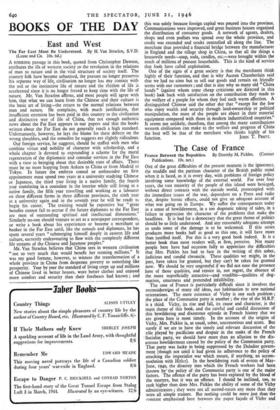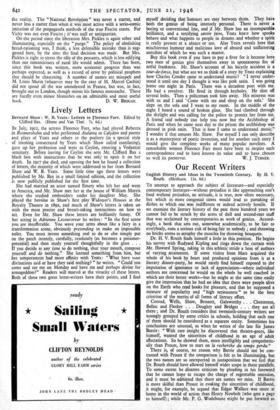The Case of France
France Between the Republics. By Dorothy M. Pickles. (Contact Publications. 10s. net.)
ONE of the great difficulties of the present moment is the ignorance, the muddle and the partisan character of the British public mind when it is faced, as it is every day, with problems of foreign policy involving some knowledge of the external world. For over four years, the vast majority of the people of this island were besieged, without direct contacts with the outside world, preoccupied with the immediate issues of the war, dependent on a Press and radio that, despite heroic efforts, could not give an adequate account of what was going on in Europe. We suffer the consequences today in a sense of bewilderment, in a too dogmatic taking of sides, in a failure to appreciate the character of the problems that make the headlines. It is bad for a democracy that the great theme of politics should be so little understood. And any reasonably adequate attempt to undo some of the damage is to be welcomed. If this series produces more books half as good as this one, it will have more than justified itself. For this is a very good book indeed. It is a better book than most readers will, at first, perceive. Not many people here have had occasion fully to appreciate the difficulties that Mrs. Pickles has had to face in the writing of this sober, judicious and candid chronicle. These qualities we might, in the past, have taken for granted, but they can't be taken for granted now. We should be very ungrateful if we aid not note the presence here of those qualities, and rejoice in, not regret, the absence of the more superficially attractive—and vendible—qualities of dog- matism, smartness and pretended infallibility.
The case of France is particularly difficult since it involves the reconsideration of many old ideas, our habituation to new national orientations. The mere existence of Vichy is one such problem ; the place of the Communist party is another ; the rise of the M.R.P. is a third. Vichy, its rise and fall, its cause and character, is the main theme of this book, and the careful and candid discussion of this bewildering and disastrous episode in French history that we are given here is most timely. In the account of the origins of Vichy, Mrs. Pickles is, as usual, sober, uncensorious and acute. But surely if we are to have the timely and relevant discussion of the role played by pacificism and despair in the ranks of the French • Socialist party, we should have more than an allusion to the dis- astrous bewilderment caused by the policy of the Communist party. That party was lucky in being suppressed by the Daladier govern- ment (though not until it had given its adherence to the policy of attacking the imperialist war which meant, if anything, an accom- modation with Hitkr). In the bewildering rush of events of May- June, 1940, the disarray into which the French workers had been thrown by' the policy of the Communist party is one of the major factors. The offence of the party has been expiated by the blood of the martyrs, but it was an offence. I should be inclined, too, to rank higher than does Mrs. Pickles the ability of some of the Vichy administrators ; they were not all second-raters any more than they were all simple traitors. But nothing could be more just than the contrast emphasised here between the paper façade of Vichy and the reality. The " National Revolution" was never a starter, and never less a starter than when it was most active with a serio-comic imitation of the propaganda methods of the true Fascist states. For Vichy was not even Fascist ; it'was null or antiquarian.
On the period since the liberation Mrs. Pickles is again sober and illuminating, especially on the " purge." The policy of abolishing bread-rationing was, I think, a less defensible mistake than is sug- gested here, by the time the final decision was made. But Mrs. Pickles is right to stress the role of the peasants, which is less edifying than our romanticisers of rural life would admit, There has been, since this book was written, mote economic progress than was perhaps expected, as well as a record of error by political prophets that should be chastening. A number of names are misspelt and M. Louis Marin (whatever may be the case of M. Marcel Cachin) did not spend all the war unmolested in France, but was, in fact, brought out to London, though minus his famous moustache. These are hardly even minor blemishes on an admirable and most useful



























 Previous page
Previous page